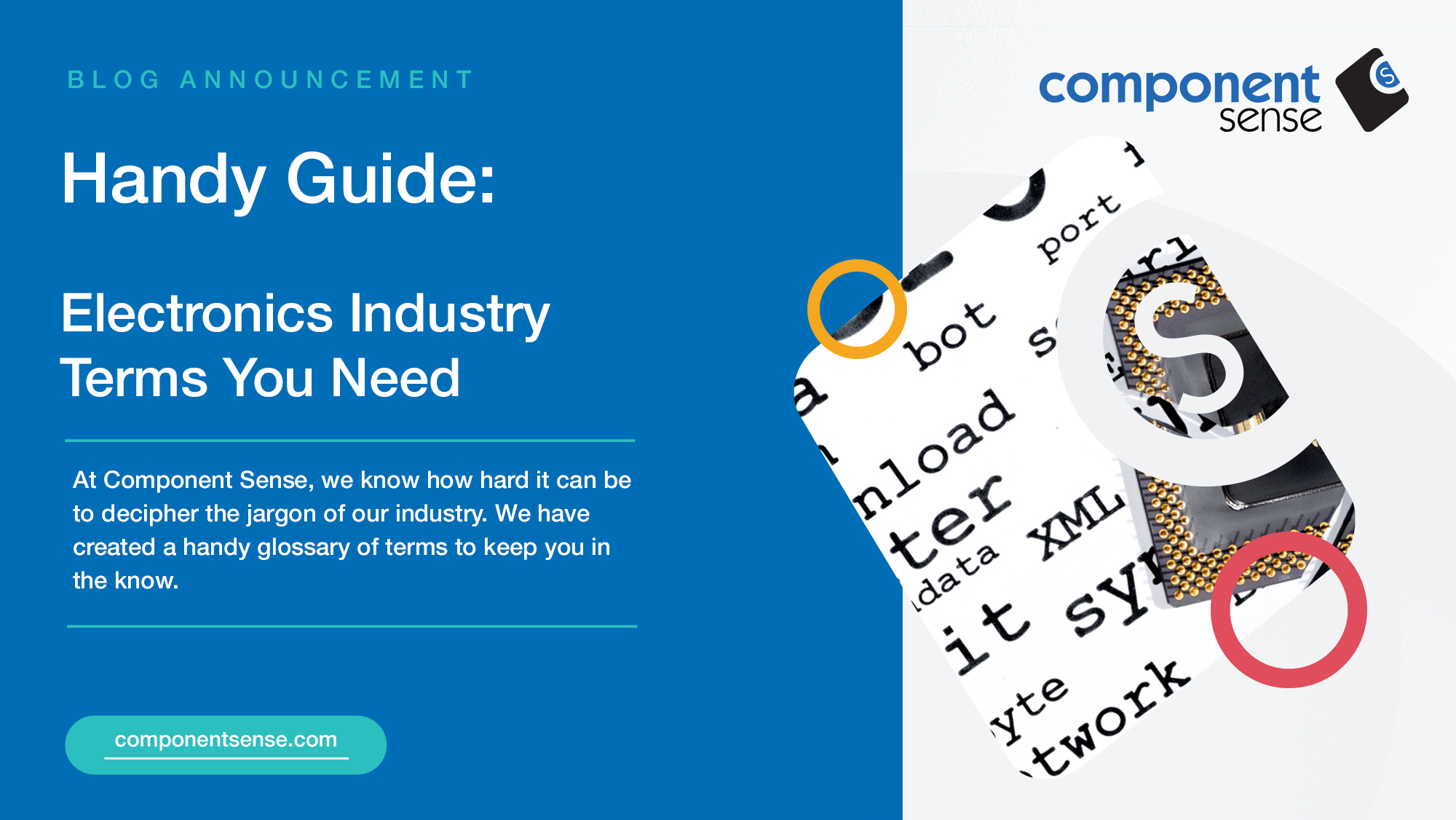Handy Guide: Electronics Industry Terms You Need to Know

Have you ever felt out of the loop in the electronics industry?
If you often find yourself mixing up OEM and EMS or mistaking a BGA for a BOM, Component Sense is here to help!
We know that our electronics industry is filled with jargon and industry-specific terminology. As difficult as it may be, it is crucial to understand the nuances between them all. We have put together this glossary to help you get to grips with all the most important industry terms. Keep reading to become an expert!
Glossary of Key Industry Terms:
- Original Equipment Manufacturer (OEM): A company that makes parts or subsystems used in another company's end products.
- Electronic Manufacturing Services (EMS): A company that offers design, manufacturing, distribution, and repair services for OEMs.
- Original Design Manufacturer (ODM): A company that designs and manufactures products later rebranded by another company.
- Contract Equipment Manufacturer (CEM): A company that manufactures electronic products on a contract basis for other companies.
- Contract Manufacturer (CM): A company that produces and ships units of a design on behalf of a hiring company.
- Original Component Manufacturer (OCM): A company that designs, markets, and manufactures individual components.
- End-of-life (EOL): The final stages of a product's lifecycle, not necessarily indicating poor operational condition.
- Bill of Materials (BOM): A list of components needed to manufacture an end product.
- Approved Vendor List (AVL): A list of approved suppliers for components on the BOM.
- Printed Circuit Board (PCB): An electronic circuit with thin strips of conducting material.
- Printed Circuit Board Assembly (PCBA): The attachment of electronic components to a completed PCB.
- Excess & Obsolete (E&O): Unneeded or outdated stock in the supply chain.
- Line Card: A brochure listing products sold by a third party.
- Request for Quotation (RFQ): A document submitted to potential suppliers for a specific stock.
- Waste Electrical and Electronic Equipment (WEEE): Regulations for proper disposal and recycling of electronic waste.
- Reduction of Hazardous Substances (RoHS): Regulations aimed at reducing hazardous substances in electronics.
Types of Electronic Components:
Component Sense stocks a wide range of electrical components that can be used on printed circuit boards, including:

- Integrated Circuit (IC): A semiconductor device containing multiple electronic circuits on a single chip. It comes in various forms: memory, logic, SRAM, DRAM, OP-AMP, amplifier, DC-DC converter, driver, receiver, flash, EPROM, EEPROM, multiplexer, MOSFET, etc.
- Ball Grid Array (BGA): A type of surface-mount packaging used for integrated circuits, offering more interconnection pins than traditional packages.
- Thin Small Outline Package (TSOP): A low-profile surface mount IC package commonly used for RAM or Flash memory ICs due to its high pin count and small volume.
- Dual In-Line DIP: An electronic component package with two parallel rows of pins for through-hole mounting on a PCB, often used for ICs.
- Displays: Includes Thin-film Transistor (TFT), Light-emitting Diode (LED), Liquid-crystal Display (LCD), Organic Light-emitting Diode (OLED), and more.
- Relay: An electrical switch that opens or closes circuits electromechanically.
- Diode: A semiconductor device that allows current to flow in one direction only.
- Electromagnetic Inductor (EMI): A component that stores and releases electrical energy.
- Memory Module (MEMMOD): An assembly containing memory components.
- Transistor: A semiconductor device that amplifies or switches electronic signals.
- Transceiver: A device combining both transmitter and receiver functions.
- Capacitor: An electronic component used to store electrical energy.
- Dielectric Capacitor
- Film Capacitor
- Ceramic/Disc Capacitor
- Electrolytic Capacitor (Aluminium & Tantalum)
- Inductor: A passive electronic component that stores energy in a magnetic field.
- Transducer: A device that converts one form of energy into another.
- Switch: An electrical component that controls the current flow in a circuit.
- Regulator: A circuit that maintains a constant output voltage.
- Translator: A device that converts one data format or protocol into another.
- Connector, Header, Socket: Components used for electrical connections.
- Crystal Oscillator: A circuit that produces a periodic electronic signal.
- Coil: A wound wire or other conductor used for inductance.
- Power Module: A device that provides power conversion or regulation.
- Coupler: A component that transfers signals or power between circuits.
Additional Terms:
- Supply Chain Management (SCM): The optimisation of goods, services, and information delivery from supplier to customer.
- International Organisation for Standardisation (IOS): An international organisation developing and maintaining manufacturing standards.
- High-volume, low-mix (HVLM): Focused on high-volume production of a limited range of products.
- Low-volume, high-mix (LVHM): Focused on various lower-volume products.
- Lead-free (Pb-free) Manufacturing: Manufacturing that adheres to efforts to eliminate lead from the electronics supply chain.
- Chip Brokers: A type of independent distributor is a subset of independent distributors in the electronics industry. While this term is somewhat broad, it refers to businesses or individuals buying and selling semiconductor components and integrated circuits, often acting as intermediaries between semiconductor manufacturers, authorised distributors, and end-users.
- Approved Supplier: Suppliers assessed for counterfeit parts and added to an approved list.
As we wrap up this glossary of industry terms, we hope this has illuminated the world of electronic components for you. Understanding these terms is vital for professionals navigating the intricate landscape of manufacturing, supply chain management, and technology.
Whether you are an electronics professional or are simply curious about the technology that shapes our world, understanding these industry terms is indispensable. We hope this glossary has been valuable!
Component Sense is proud to bring you knowledge and expertise about the electronics industry. If you have any questions, please feel free to contact us by clicking the button below: